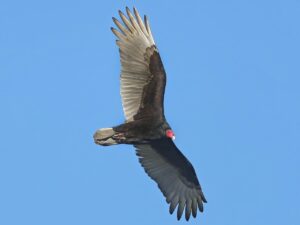by Kennedy Zittel, naturalist
 Spring is here! And with that brings a lot of birds returning for the warmer months once more. Among those returning birds is one of my all-time favorites! Perhaps not everyone’s top choice when thinking of their favorite bird, but it holds a top spot on my list. Soaring high in the sky with its wings held in a V-shape… the turkey vulture!
Spring is here! And with that brings a lot of birds returning for the warmer months once more. Among those returning birds is one of my all-time favorites! Perhaps not everyone’s top choice when thinking of their favorite bird, but it holds a top spot on my list. Soaring high in the sky with its wings held in a V-shape… the turkey vulture!
Now hold on, I know what you are probably thinking, but they are actually really neat birds with some remarkable adaptations that allow them to live as they do. They also do us and the environment a HUGE favor. Without scavenging animals like vultures, there would be dead animals and diseases everywhere…yuck.
I’ve heard people say that they don’t like them because vultures “look weird” because they have no feathers on their heads, but that helps keep them clean while they eat. Their lack of head feathers is where they get their name from – because they resemble wild turkeys (who also lack head feathers).
Besides their iconic bald head, turkey vultures have dark-colored feathers with a 6-foot wingspan. When they fly they hold their wings in a V-shape. V for Vulture! With those large wings they can soar up to 200 miles in a single day.
Another reason people give for not liking them is because of what they eat. Turkey vultures aren’t the only raptors that eat carrion (dead things), other raptors like red-tailed hawks and bald eagles eat dead things too (and everyone loves those guys -how unfair). A lot of animals are opportunistic – eating dead animals is an easy meal for many. However, turkey vultures are the only scavenging bird that cannot kill their own prey. Their feet are not strong enough to grab live prey, so instead, they use their strong beak to rip apart already dead things.
Vultures have the largest olfactory (smelling) system of all birds – an adaptation that allows them to find food far away. They can smell a dead animal from over a mile away… whew!
Vultures play a big role in keeping the environment clean AND healthy. Their stomachs help stop diseases from spreading in the environment – saving a lot of other animals (and us) from getting sick. Their stomachs are highly acidic, which kills bacteria and diseases. That means that if they eat an animal that has a disease, that disease dies in the vulture’s stomach. Their stomachs are strong enough to get rid of things like Salmonella, E. coli, botulism, rabies, anthrax, and more.
Speaking of super stomachs, if they feel threatened they will throw up! Their stomach acid is around 100 times more acidic than a human’s (and stronger than battery acid) and they can send their puke up to 10 feet away. That is one powerful way to keep predators away!
Super soaring, super smelling, super stomachs… all of those fun adaptations help keep them fed and the environment clean – a real life superhero! Nature’s clean-up crew hard at work, thank you turkey vultures!
Photo credit: Cornell, All About Birds
